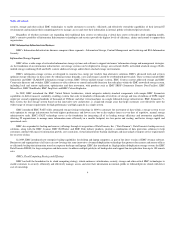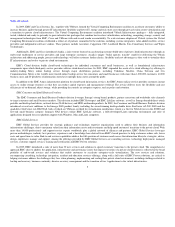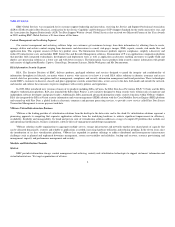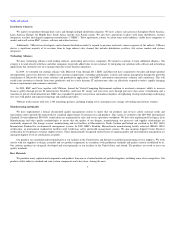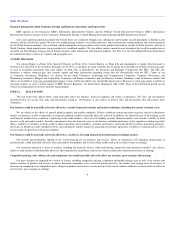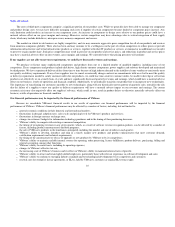EMC 2009 Annual Report Download - page 15
Download and view the complete annual report
Please find page 15 of the 2009 EMC annual report below. You can navigate through the pages in the report by either clicking on the pages listed below, or by using the keyword search tool below to find specific information within the annual report.
Table of Contents
economic conditions, trade restrictions, import or export licensing requirements, the overlap of different tax structures or changes in international tax laws,
changes in regulatory requirements, compliance with a variety of foreign laws and regulations and longer payment cycles in certain countries. In addition, we
hold a significant portion of our cash and investments in our international subsidiaries. Potential regulations could impact our ability to transfer the cash and
investments to the United States. Additionally, should we desire to repatriate cash, we may incur a significant tax obligation.
We operate a Venezuelan sales subsidiary in which the Bolivar is the functional currency. Due to limitations in accessing the dollar at the official
exchange rate, we have utilized the parallel exchange rate available in the country to translate the foreign currency denominated balance sheet. Our operations
in Venezuela include U.S. dollar-denominated assets and liabilities which we remeasure to Bolivars. The remeasurement may result in transaction gains or
losses. We have used either the official exchange rate or the parallel exchange rate to remeasure these balances based upon the expected rate at which we
believe the items will be settled. As a result of continued hyper-inflation in Venezuela, effective in 2010, we have modified the functional currency to be the
U.S. dollar. As a result of this change, Bolivar-denominated transactions will be subject to exchange gains and losses that may impact our earnings. While we
do not believe this change will have a material impact on our financial position, results of operations or cash flows, these items could be materially adversely
affected if there is a significant change in exchange rates.
Undetected problems in our products could directly impair our financial results.
If flaws in design, production, assembly or testing of our products (by us or our suppliers) were to occur, we could experience a rate of failure in our
products that would result in substantial repair, replacement or service costs and potential damage to our reputation. Continued improvement in manufacturing
capabilities, control of material and manufacturing quality and costs and product testing are critical factors in our future growth. There can be no assurance
that our efforts to monitor, develop, modify and implement appropriate test and manufacturing processes for our products will be sufficient to permit us to
avoid a rate of failure in our products that results in substantial delays in shipment, significant repair or replacement costs or potential damage to our
reputation, any of which could have a material adverse effect on our business, results of operations or financial condition.
Our business could be materially adversely affected as a result of the risks associated with alliances.
We have alliances with leading information technology companies and we plan to continue our strategy of developing key alliances in order to expand
our reach into markets. There can be no assurance that we will be successful in our ongoing strategic alliances or that we will be able to find further suitable
business relationships as we develop new products and strategies. Any failure to continue or expand such relationships could have a material adverse effect on
our business, results of operations or financial condition.
There can be no assurance that companies with which we have strategic alliances, certain of which have substantially greater financial, marketing or
technological resources than us, will not develop or market products in competition with us in the future, discontinue their alliances with us or form alliances
with our competitors.
Our business may suffer if we cannot protect our intellectual property.
We generally rely upon patent, copyright, trademark and trade secret laws and contract rights in the United States and in other countries to establish and
maintain our proprietary rights in our technology and products. However, there can be no assurance that any of our proprietary rights will not be challenged,
invalidated or circumvented. In addition, the laws of certain countries do not protect our proprietary rights to the same extent as do the laws of the United
States. Therefore, there can be no assurance that we will be able to adequately protect our proprietary technology against unauthorized third-party copying or
use, which could adversely affect our competitive position. Further, there can be no assurance that we will be able to obtain licenses to any technology that we
may require to conduct our business or that, if obtainable, such technology can be licensed at a reasonable cost.
From time to time, we receive notices from third parties claiming infringement by our products of third-party patent or other intellectual property rights.
Responding to any such claim, regardless of its merit, could be time-consuming, result in costly litigation, divert management's attention and resources and
cause us to incur significant expenses. In the event there is a temporary or permanent injunction entered prohibiting us from marketing or selling certain of our
products or a successful claim of infringement against us requiring us to pay royalties to a third party, and we fail to develop or license a substitute
technology, our business, results of operations or financial condition could be materially adversely affected.
We may become involved in litigation that may materially adversely affect us.
From time to time, we may become involved in various legal proceedings relating to matters incidental to the ordinary course of our business, including
patent, commercial, product liability, employment, class action, whistleblower and other litigation and
14


